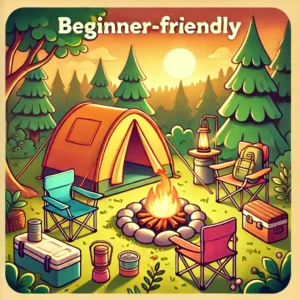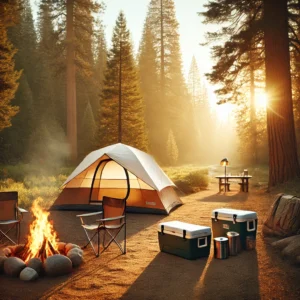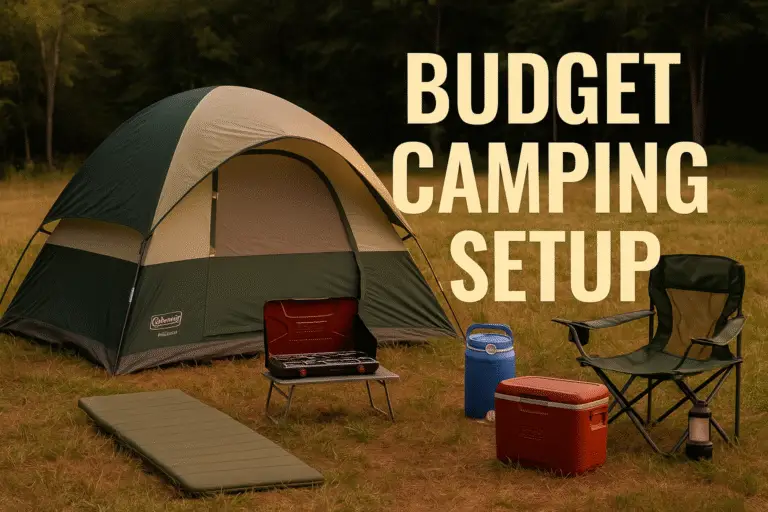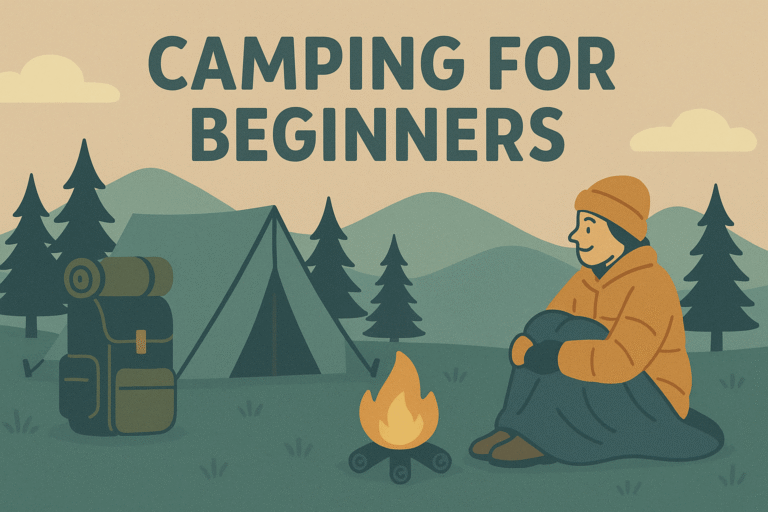 Introduction: Embracing the Camping Experience
Introduction: Embracing the Camping Experience
Camping represents a unique opportunity to connect with nature while stepping away from the demands of modern life. Although it might seem overwhelming for beginners, with proper guidance and preparation, this outdoor adventure can be both rewarding and enjoyable. Many first-time campers experience a mix of excitement and anxiety, often wondering how to camp effectively and make the most of their experience.
One of the key aspects to a successful camping trip is preparation. For novices, understanding the essentials of camping can significantly enhance their confidence and readiness. Knowing what gear is needed, the appropriate location to choose, and understanding the basics of outdoor survival can turn a potentially daunting experience into a fulfilling one. Additionally, learning beginner camping tips can contribute to a smooth process, allowing individuals to focus on the joy of exploring the great outdoors.
For those embarking on their first camping experience, it is essential to equip oneself with a beginner camping guide to navigate through practical considerations. From selecting the right tent to preparing meals over a campfire, having a clear framework can alleviate stress and enable beginners to cherish the serenity of nature.
The essence of camping lies in the relaxation it offers and the memories one creates away from home. With the right camping tips, novices will not only feel more prepared but will also find excitement in every aspect of their journey. Whether it is the thrill of setting up a tent for the first time or the pleasure of enjoying a campfire under the stars, each step taken brings a deeper appreciation for the outdoors. Embracing the camping experience allows beginners to build lasting skills and foster a love for nature that can be cherished for years to come.
📌 Table of Contents
- Tip 1: Choose the Right Campsite
- Tip 2: Pack Smart and Light
- Tip 3: Understand the Weather
- Tip 4: Set Up Camp Wisely
- Tip 5: Learn Basic Outdoor Skills
- Tip 6: Respect Nature and Leave No Trace
- Tip 7: Keep Safety in Mind
- Tip 8: Plan Your Meals
- Tip 9: Embrace the Experience
- Tip 10: Test Your Gear Before You Go
- Conclusion: Your Camping Journey Begins
Tip 1: Choose the Right Campsite
Selecting the right campsite is pivotal for a successful first-time camping experience. For beginners, the choice of location can significantly impact comfort, safety, and overall enjoyment. When considering campsites, it is essential to evaluate various factors including proximity to amenities, terrain, and safety concerns.
For novice campers, seeking campsites near essential facilities, such as bathrooms and water sources, can enhance convenience and peace of mind. This is particularly important for those new to camping who may not yet have developed the confidence to venture far into the wilderness. Many established campgrounds are equipped with restrooms, showers, and even nearby grocery stores, which can ease anxiety for beginners venturing out for the first time.
Additionally, the terrain is a crucial consideration. Beginners should look for relatively flat landscapes that are easy to navigate. Rocky or steep terrains can present challenges that may feel overwhelming for those who are still learning the ropes of camping. Websites featuring beginner camping guides often provide detailed information about different types of campsites, helping newcomers select one that suits their skill level.
Safety is another paramount concern when selecting a campsite. It is advisable to choose a location that is not only accessible but also free from potential hazards such as falling branches, flooding, or proximity to wildlife. Researching local regulations and guidelines regarding wildlife can provide insights into safety protocols for beginners. Online resources, user reviews, and camping apps can also be invaluable tools for finding established and well-reviewed sites that cater to novice campers.
In conclusion, the importance of choosing the right campsite cannot be overstated, especially for those participating in camping for the first time. By considering amenities, terrain, and safety, beginner campers can enhance their experience and acquire the necessary skills for future adventures.
Tip 2: Pack Smart and Light
Packing efficiently is crucial for a successful camping trip, especially for beginners who are still learning the ropes of how to camp. The goal is to strike a balance between bringing necessary items and avoiding overpacking. Overloading your backpack can lead to discomfort on the trail and can limit your capacity to enjoy your surroundings, while underpacking may leave you without essential gear that could make camping more enjoyable. Therefore, understanding what to pack and how to organize it is key to a successful camping experience.
Firstly, it is important to categorize your gear into essential groups. The main categories typically include shelter, cooking equipment, clothing, and personal items. For shelter, consider a lightweight tent, sleeping bag, and sleeping pad. These fundamental items ensure that you are comfortable and protected from the elements. When it comes to cooking, pack a portable stove, a lightweight cookware set, and sufficient food supplies, while also considering how to conserve cooking space and weight on your journey.
Clothing should be selected based on the weather conditions of your destination. Opt for moisture-wicking fabrics and layers that can be added or removed as temperatures change. Include a waterproof jacket and sturdy footwear as well. Personal items such as a first-aid kit, flashlight, and multi-tool should not be overlooked, as they can prove invaluable during your camping adventure.
Additionally, using packing cubes or compression bags can significantly enhance your organization and maximize space efficiency within your backpack. Consider creating a checklist before you head out, which can serve as a beginner camping guide for your essentials and help you to avoid unnecessary items. By packing smart and light, you will pave the way for a more enjoyable experience, allowing you to immerse yourself fully in the wonders of nature during your first time camping.
Tip 3: Understand the Weather
When embarking on a camping trip, particularly for the first time, understanding the weather is one of the key camping tips for beginners. The foundation of a successful and enjoyable camping experience lies in thorough preparation, and the weather forecast plays a pivotal role in this process. Not only does the weather dictate your attire, but it also influences your planned activities and safety measures. For instance, sunny conditions can create a perfect backdrop for hiking and outdoor cooking, while rain or high winds could necessitate a reassessment of your itinerary.
Different weather conditions can significantly alter the dynamics of your camping experience. For example, a sudden drop in temperature can lead to discomfort at night if you’re not properly equipped with adequate sleeping gear or clothing layers. Conversely, extreme heat during the day could necessitate hydration strategies and shelter from the sun to prevent heat exhaustion. Therefore, before you pack your bags, it is imperative to check the weather forecast specific to your camping location. Online platforms, weather apps, and local meteorological services can offer accurate insights into what to expect.
Furthermore, as a beginner camper, you should prepare for varying weather scenarios. Always pack versatile clothing that includes moisture-wicking layers, waterproof jackets, and sun protection. A beginner camping guide would recommend bringing along a tent that can withstand rain and wind along with a robust, waterproof groundsheet. In case of unexpected changes, it’s wise to have a backup plan. Stay informed about the local weather alerts and be prepared to adjust your camping site or even head home if conditions become dangerously inclement. Through these measures, you can enhance your camping experience and ensure safety for all participants.
Tip 4: Set Up Camp Wisely
Setting up a campsite involves more than simply pitching a tent. For beginners, understanding how to camp effectively can enhance the overall experience, making it enjoyable and comfortable. One of the first things to consider is the location of your campsite. Prioritize finding flat ground that is free from rocks and debris. This will not only make sleeping more comfortable but also ensure proper drainage in case of rain.
Another important factor is the proximity to water sources. While it is convenient to have water nearby, setting up camp too close can pose risks such as flooding or attracting wildlife. A safe distance of at least 200 feet is recommended to mitigate these risks. Additionally, consider the direction of the wind and potential weather changes; establishing camp in a natural windbreak, such as a grove of trees or a hill, can provide shelter from harsh elements.
Wildlife awareness is crucial when selecting a campsite, especially for first-time camping enthusiasts. Be mindful of local fauna, and avoid areas known for bear activity or other potentially dangerous wildlife. Instead, select a spot cleared of brush and with existing fire rings to minimize your environmental impact. Once you have chosen your ideal location, it is time to set up your tent. Lay out the tent footprint first, and ensure it aligns with the campsite’s flat terrain. Secure the tent stakes firmly into the ground to avoid any mishaps.
Finally, it is beneficial to establish a designated area for cooking and food storage, at least 100 feet from your sleeping area. This minimizes the risk of attracting animals to your campsite. Following these beginner camping tips will contribute to a more enjoyable experience and allow you to focus on the beauty of nature.
Tip 5: Learn Basic Outdoor Skills
Acquiring essential outdoor skills is a crucial aspect of successful camping for beginners. To ensure an enjoyable experience while engaging with nature, it is beneficial to familiarize oneself with the foundational skills required for outdoor activities. Knowing how to properly execute these skills will enhance the overall camping experience and contribute to a greater appreciation of the outdoors.
One of the primary skills to master is fire starting. Having a reliable fire can provide warmth, light, and a means to cook food. Beginners should practice various methods of starting a fire, such as using matches, lighters, or even friction methods like a bow drill. It’s essential to understand how to select the proper materials, including tinder and kindling, ensuring that you can ignite and maintain a fire safely. Remember to follow local regulations regarding fire usage and always practice fire safety by extinguishing campfires fully before leaving the site.
Another fundamental skill to develop is water purification. Clean drinking water is vital during camping trips, and knowing how to purify water can prevent potential health issues. Beginners should learn how to use water purification tablets, filters, or boiling techniques effectively. Practice collecting water from natural sources and treating it before your next camping adventure, as this skill will serve you well in the wilderness.
Setting up a tent is also essential for a comfortable camping experience. Ensure you know how to pitch your tent correctly, taking note of the tent’s instructions. Practice the setup process at home or in your backyard before heading out for your first time camping. This practice will build confidence and save time during your camping trip, making your outdoor experience more enjoyable.
Incorporating these basic outdoor skills into your beginner camping guide ultimately empowers you to handle unexpected situations and enhances your overall ability to enjoy nature. As you prepare for your next adventure, make sure to dedicate time to practice and refine these essential skills.
Tip 6: Respect Nature and Leave No Trace
As you prepare for your first time camping, it is imperative to acknowledge the significance of environmental conservation during your outdoor experiences. Camping allows us to connect with nature, but it also comes with the responsibility to protect the ecosystems we visit. Adhering to principles of conservation not only ensures a better experience for yourself but also for future campers. One effective approach to responsible camping is following the Leave No Trace (LNT) principles.
The Leave No Trace seven principles serve as a guideline for minimizing your impact on the environment while camping. The principles include: Plan Ahead and Prepare, Travel and Camp on Durable Surfaces, Dispose of Waste Properly, Leave What You Find, Minimize Campfire Impact, Respect Wildlife, and Be Considerate of Other Visitors. By abiding by these principles, beginner campers can ensure that their activities do not disrupt the natural habitat around them.
For instance, when choosing a camping spot, selecting a durable surface such as established campsites or gravel can significantly reduce damage to vegetation. Additionally, proper disposal of waste, whether it be trash, food scraps, or human waste, is crucial not only for environmental health but also for wildlife safety. Being mindful of your presence and respecting wildlife is important, as their habitats are fragile and easily disturbed by human activity.
The essence of these practices lies in fostering an awareness of our interconnectedness with the environment. Each action taken while camping contributes to the overall health of the ecosystem. As you gather camping tips, remember that your choices can either safeguard nature for future generations or contribute to its decline. Committing to these principles leads to enriching experiences that align with the ethos of camping for beginners, while nurturing the great outdoors that we cherish.
Tip 7: Keep Safety in Mind
When embarking on a camping trip, particularly for beginners, it is essential to prioritize safety to ensure a pleasant and accident-free experience. Familiarizing oneself with basic first aid procedures can significantly enhance a camper’s preparedness for potential accidents or injuries. Carrying a well-stocked first aid kit is highly recommended, which should include items such as adhesive bandages, antiseptic wipes, gauze pads, and a whistle. Having knowledge of how to treat minor injuries will boost your confidence and allow you to handle emergencies effectively.
Another crucial aspect of camping safety involves recognizing poisonous plants. Before heading out, take the time to research local flora and become acquainted with plants like poison ivy, poison oak, and poison sumac, which can cause severe skin reactions. This knowledge can prevent painful encounters and enhance your overall camping for beginners experience. Equipped with this understanding, you can confidently navigate your environment without fear of encountering harmful vegetation.
To navigate the surroundings confidently, carrying a map or GPS device is vital. Even in established campgrounds, it is easy to become disoriented amidst the landscape’s unfamiliar terrain. Being able to locate your campsite or critical resources can be invaluable, especially for first-time campers who may not be accustomed to natural settings. Additionally, it is wise to inform a trusted friend or family member about your camping plans, including your destination and expected return time. This simple precaution can be lifesaving in case of unexpected events, ensuring that someone is aware of your whereabouts should you need assistance.
By considering these safety measures, you enhance your beginner camping guide, providing peace of mind while allowing you to focus on enjoying the great outdoors. Remember, a well-planned trip with safety in mind not only elevates your camping experience but also sets the stage for successful future outings.
Tip 8: Plan Your Meals
Meal planning is a crucial component of successful camping for beginners. When you are out in nature, having a well-designed meal plan ensures that you not only have enough food but also enjoy a variety of meals that are easy to prepare. Thoughtful planning can contribute to a stress-free first-time camping experience, freeing you to focus on enjoying the outdoors instead of worrying about what to eat.
When considering meals for camping, aim for options that require minimal equipment and ingredients. Lightweight, easy-to-cook foods such as pasta, rice, canned beans, and freeze-dried meals are excellent choices. These staples can be versatile; for instance, you can combine pasta with various sauces or vegetables, providing different meal options throughout your trip. Another simple, yet satisfying, meal could include pre-cooked sausages or hot dogs, which can easily be cooked over a campfire.
Snacks are also important for maintaining energy levels while camping. Foods like trail mix, granola bars, and fresh fruit are not only easy to pack but provide the necessary fuel for hiking and other outdoor activities. Including a balance of protein, carbohydrates, and fats can ensure that you are adequately nourished during your adventure.
Food storage is another critical aspect of meal planning. Use airtight containers or resealable bags to keep food fresh and minimize waste. It is essential to be aware of how to store food safely, as potential wildlife encounters pose risks. Always store food away from your sleeping area, ideally in bear-proof containers or a high, secure location to deter animals from rummaging through your supplies.
By effectively planning your meals and storage strategies, you can greatly enhance your camping experience and ensure that your trip is enjoyable and memorable. These beginner camping guide insights will lead to successful meal preparation, allowing you to focus on the rewarding aspects of camping.
Tip 9: Embrace the Experience
Camping for beginners can sometimes feel overwhelming, particularly with the amount of preparation and planning that goes into a successful trip. However, one of the most valuable camping tips is to fully embrace the experience. Disconnecting from technology is a critical first step in immersing oneself in the natural surroundings. Modern convenience often leads to distractions that detract from the essence of camping. By turning off devices, campers open themselves up to the beauty of nature.
Engaging with the environment offers numerous benefits, both for mental well-being and personal connections. The sights and sounds of the outdoors can provide a sense of tranquility that is often lost in our day-to-day lives. Observing wildlife, stargazing at night, or simply listening to the rustling of leaves can foster a profound appreciation for natural beauty. This connection with the environment is especially important for those new to camping, as it enhances the overall experience and helps to build lasting memories.
Moreover, spending quality time with friends and family while camping strengthens bonds and creates shared experiences. As you embark on your camping journey, embrace opportunities for spontaneous adventures. Whether it is discovering a hidden trail, trying a new cooking technique over the campfire, or sharing stories by the flames, these unplanned moments can become highlights of your trip. By staying open-minded and adaptable, beginners can enhance their first-time camping encounters and build a solid foundation for future outdoor endeavors.
As you prepare for your journey, remember that camping goes beyond the basics of setting up a tent or packing necessities. The heart of the experience lies in your willingness to engage fully with the world around you, cultivate relationships, and seize the day with spontaneity. Embracing the essence of camping creates a pathway for deeper enjoyment and memorable experiences.
Tip 10: Test Your Gear Before You Go
One of the most overlooked beginner camping tips is testing your gear in advance. Before heading into the wild, set up your tent in your backyard, fire up your camp stove, and make sure your flashlight, sleeping bag, and other essentials are in working order. This simple step can prevent frustration at the campsite and gives you a chance to familiarize yourself with your equipment in a low-stress environment. By doing a test run, you’ll feel more confident and better prepared when you’re out in nature.
Conclusion: Your Camping Journey Begins
As you prepare for your first camping trip, remember that the wealth of camping tips discussed throughout this guide is your stepping stone to a successful adventure in the great outdoors. Whether you are a complete novice or someone who has enjoyed a few trips, understanding the core elements of how to camp effectively can significantly enhance your experiences.
Each tip is designed not only to ensure your safety and comfort but also to help you appreciate the beauty of nature. From choosing the right gear to setting up your campsite and practicing essential skills, these first time camping strategies will serve as a valuable resource as you embark on this journey. It is vital to note that preparation and knowledge are key components of successful camping for beginners; the more informed you are, the more enjoyable your experiences will be.
We encourage you to implement these essential camping tips during your upcoming adventures. Embrace the thrill of exploration and the joy of reconnecting with nature. Each trip into the wilderness will offer new challenges and learning opportunities, allowing you to grow as a camper. Don’t forget that camping is not just about the destination; it is equally about the memories you create along the way.
For those looking to expand their coding repository of insights, we invite you to explore more camping tips on our site. Engaging with other like-minded adventurers in the comments section will further enrich your understanding and possibly lead to discovering new methods for making the most of your time outdoors. Your camping journey starts with you, and we are excited to see where it takes you




